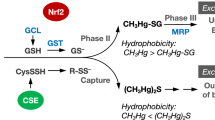Summary
Most strains of staphylococci, streptococci, yeasts andE. coli isolated from human faeces, could synthesize methylmercury compounds. In contrast, few strains of obligate anaerobes could do so. Up to 6 ng methylmercury/ml were formed in 44 h from 2 μg mercuric chloride.
Similar content being viewed by others
Literatur
S. Jensen andA. Jernelöv, Nature, Lond.223, 753 (1969).
F. Matsumura, Y. Gotoh, andG. M. Boush, Bull. envir. Contam. Toxic.8, 267 (1972).
M. Abdulla, B. Arnesjö andI. Ihse, Scand. J. Gastroent.8, 565 (1973).
T. Edwards andB. C. McBride, Nature, Lond.253, 462 (1975).
I. R. Rowland, Fd. Cosmet. Toxic.12, 293 (1974).
G. Westöö, Acta chem. scand.20, 2131 (1966).
N. Imura, E. Sukegawa, S. K. Pan, K. Nagao, J. Y. Kim, T. Kwant andT. Utika, Science172, 1248 (1971).
M. Yamada andK. Tonomura, J. Ferment. Tech.50, 159 (1972).
Author information
Authors and Affiliations
Rights and permissions
About this article
Cite this article
Rowland, I.R., Grasso, P. & Davies, M.J. The methylation of mercuric chloride by human intestinal bacteria. Experientia 31, 1064–1065 (1975). https://doi.org/10.1007/BF02326961
Issue Date:
DOI: https://doi.org/10.1007/BF02326961



